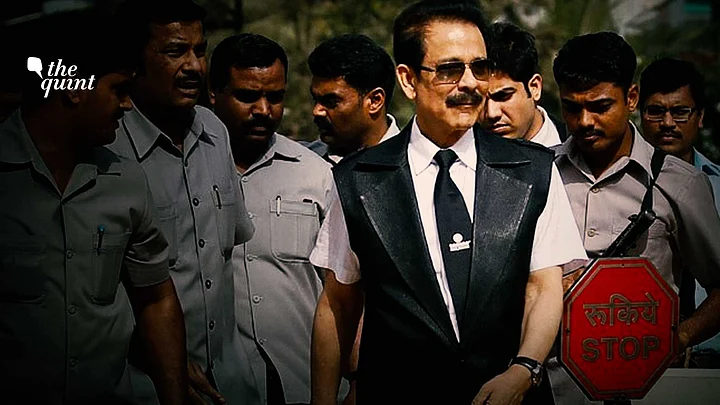If you have ever been part of the Sahara Pariwar, it is quite likely that you would have attended group chief Subrata Roy’s boringly long lecture on ‘sukh, shanti and samriddhi (happiness, peace and prosperity).’
You would most likely have marvelled at the group’s majestic Lucknow headquarters, the venue of most of Roy’s lectures. The futility of spending so much time and resources on holding such mega events, like Roy’s so-called orientation programmes, may have crossed your minds.
It is quite likely that you would have heard the seemingly rags to riches story of Roy multiple times, as to how he started with a modest sum of Rs 2,000 in 1978 and scaled new heights in no time.
For a group that claims to be a large family, Sahara India Pariwar, with Roy as its managing worker, the condition of scores of employees barely surviving on subsistence level salary would have moved you.
However, what would have intrigued you the most was the inability of brand Sahara to reflect the strength it claims to possess. Take a look at some of the assets and claims:
- Sahara owns Aamby Valley, which is a marquee project to have in your portfolio. It also claimed to have a land bank in excess of 36,000 acres spread across different locations in the country.
- In the midst of a protracted legal battle with market regulator SEBI, Sahara group acquired iconic properties like London’s Grosvenor House and New York’s Plaza Hotel.
- Sahara group used to own IPL’s Pune franchise and had a significant stake in Formula One racing team Force India.
- The group had plans to develop as many as 60 luxurious townships all across the country with a planned investment of Rs 90,000 crore. The process of land acquisition was almost over for many of the townships.
- The group used to employ close to 11 lakh people and had presence in sectors like real estate, financial services, insurance, media and entertainment, sports and healthcare.
- Bollywood stars and famous sports personalities used to be regular visitors at most of Sahara’s functions.
Despite such a seemingly impressive list of assets and credentials, brand Sahara has always under-performed. Why is it the case? The answer lies in how Sahara group has fared on regulatory tests multiple times.
Sahara’s Tryst With RBI & SEBI
The group’s first tryst with regulatory roadblock came in 2008. The Reserve Bank of India (SBI) had directed Sahara Financial Corporation the same year to stop raising fresh deposits. It was a big blow as it had the potential to choke cash flow of other group businesses that were struggling to generate profit. The group required steady stream of fresh funds to keep its diverse businesses afloat.
Then came yet another blow, this time from market regulator SEBI. Two of Sahara’s companies engaged in real estate sector were asked to stop issuing bonds to investors.
According to reports, the two companies raised money in excess of Rs 20,000 crore from nearly three crore people all across the country. Under the scheme, investors were promised a bumper return in ten years.
SEBI’s ruling was that for any company raising money from more than 50 people through bonds, a prior approval from the market regulator was mandatory. Since Sahara did not have such approval, it was in violation of existing provisions.
Sahara officials, however, would argue that they had the approval to raise money from the ministry of corporate affairs. The matter reached the Supreme Court and the apex court ruled in favour of SEBI in August 2012. The Sahara group was asked to deposit Rs 24,000 crore with the SEBI within 90 days.
The regulator was tasked with returning the money to bonafide investors. The failure to fully comply with the apex court’s order on time resulted in the arrests of Roy and two of his colleagues. The arrest was a big blow to the image of the group and its managing worker.
Sahara Group Lacked Transparency
The backers of Sahara group have been of the view that the group has contributed to financial inclusion by offering financial services to those who have been outside of the banking system.
Market watchers, however, argue that the group has always lacked transparency. And it has been found wanting in following regulations in letter and spirit many times.
They observe that the group kept changing money raising financial instruments from simple deposits to bonds and subsequently to cooperative societies – in a bid to evade regulatory oversight.
There have been other allegations against the group as well. According to reports, once invested, redemption is an uphill task in any of the group’s products. Investors are persuaded to keep reinvesting in different schemes to ensure that there is no cash outflow. And critics have highlighted the group’s lack of transparency in source and use of funds.
Lack of transparency has perhaps hurt the Sahara brand more than anything else. And the group’s evasive tactics with regard to regulatory frameworks has not gone down well either.
Those associated with the group now claim that things have begun to fall in places after 10 turbulent years. Will Roy learn from the past and bring in much needed transparency?
The group’s track record all these years does not inspire much confidence. But, we have had instances of business groups reinventing themselves to survive and thrive.
Can Roy rebuild the group all over again?
(Disclaimer: This piece is Part-II of a series of articles by The Quint on Netflix’s documentary 'Bad Boy Billionaires: India'. The documentary covers the lives of four Indian billionaires – Vijay Mallya, Subrata Roy, Nirav Modi and Ramalinga Raju. The first piece can be accessed here.)
(The author is a Delhi-based journalist covering politics, business, and the economy. This is an opinion piece and the views expressed are the author's own. The Quint neither endorses nor is responsible for them.)
